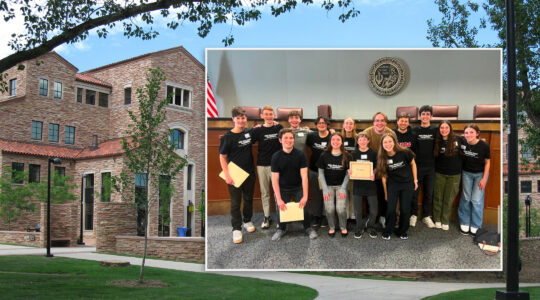The ugly incident at Brooklyn College, where two supporters of the BDS movement (Boycott, Divestment and Sanctions against Israel) were invited to speak on campus last week, was less about freedom of speech, as its defenders claimed, than about the political science department’s sponsorship of a program seeking to delegitimize the State of Israel.
In the heat of passion over colleges hosting controversial anti-Israel speakers, issues like academic freedom and freedom of speech and accusations of anti-Semitism tend to be used too often, and inaccurately, fanning flames rather than shedding light.
To be clear, we endorse the right of speakers to be heard on campus even as we may strongly oppose their hate-filled views, as in this case. The same holds true for the Brooklyn College Hillel, which did not call for the program to be canceled. Though it should be noted that BDS advocates are not only opposed to the occupation of the West Bank but, in advocating for “the right of return,” in essence are calling for the end of Israel as a Jewish state.
Unfortunately, when some pro-Israel politicians called for the program’s cancellation, and even threatened withholding funds from the school, and when State Assemblyman Dov Hikind described Brooklyn College’s president, Karen Gould, as “a disaster for Brooklyn College students,” it only served to increase media attention and generate sympathy for BDS proponents. It also deflected attention from the real issue, which was the political science department’s sponsorship of the event, using university dollars and implying an endorsement of the guests’ views.
The invitation to the BDS speakers did not come out of the blue. It was symptomatic of a the department faculty long accused of a strong anti-Israel bias and of intimidating students who disagree with a one-sided approach to the Mideast conflict where Israel is to blame.
Students who complained about the program in advance were advised to come, listen and engage in the discussion. But a number of witnesses at the event noted that Jewish students were told they were not welcome, and identifiably Orthodox Jews were forced to leave, proof of the ugly racism at play here.
The Anti-Defamation League, in an open letter from National Director Abraham Foxman “on academic freedom and university responsibility,” asserts that the BDS movement is “at its very core anti-Semitic” and racist, and that, by contrast, a Ku Klux Klan event would never be funded by university dollars.
He suggests that in the future, students, not university officials, invite speakers of their choosing and that “university presidents … use their bully pulpits to reject … messages of hate and anti-Semitism.”
And what of the role of politicians?
The positive result from the pushback by Rep. Jerrold Nadler and Councilman Brad Lander and a number of other politicians, in a letter to Gould, was that some progressive politicians spoke out against BDS, as did the college — a significant step — and the political science faculty members “clarified” their position and expressed willingness to co-sponsor “pro-Israel” programs.
But as Doug Chandler reports in these pages, those in the trenches of Jewish campus life often prefer to handle these incidents internally, and sometimes behind the scenes, rather than have politicians turn them into media events, giving wide-scale free propaganda to Israel’s enemies. That might mean ignoring a campus program delegitimizing Israel, and focusing energy instead on creating a pro-Israel event to attract students.
Much depends on specific campuses, personalities and circumstances. But let’s hope some lessons will be learned from this ugly incident at Brooklyn College, like deciding if, and how best, to respond, and when to avoid a media frenzy.
The New York Jewish Week brings you the stories behind the headlines, keeping you connected to Jewish life in New York. Help sustain the reporting you trust by donating today.




